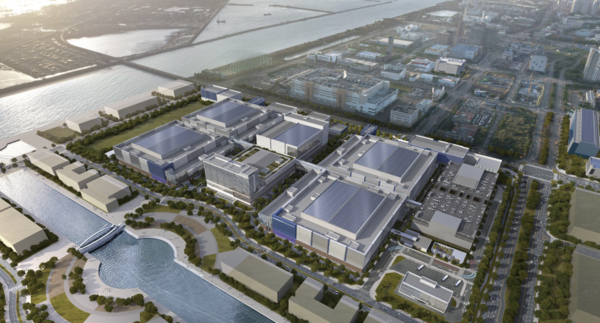
For the first time, Samsung Biologics surpassed 1.58 trillion won ($1.24 billion) in sales in the first half of 2023, driven by growth in its contract manufacturing organization (CMO) and biosimilar businesses.
Samsung Biologics said Wednesday that it posted consolidated sales of 1.5871 trillion won and an operating profit of 445.2 billion in the first half-year. Successful order receipts and maximized production efficiency led to a 36 percent year-on-year revenue increase of 424.4 billion and operating profit growth of 99.1 billion won (29 percent), showing its best first-half performance.
The consolidated second-quarter revenue was 866.2 billion won, and operating profit was 253.4 billion won, up 218.8 billion won (33 percent) and 83.7 billion won (49 percent) year-on-year. Its compound annual growth rate (CAGR) of consolidated second-quarter revenue and operating profit since 2020, when Plant No. 3 became fully operational, is 41 percent and 46 percent.
On a separate basis, Samsung Biologics reported revenue of 1.28 trillion won and an operating profit of 485 billion won in the first half. In the second quarter, revenue increased 27 percent (133.5 billion won) to 637.2 billion won, and operating profit increased 48 percent (82.2 billion won) to 254.1 billion won. The substantial increase in revenue and operating profit was driven by long-term large orders and maximization of efficiency through the entire operation of its three factories, resulting in an operating margin of 39.9 percent in the second quarter.
Samsung Bioepis posted revenue of 469.3 billion, and an operating profit of 78 billion won for the first half. In the second quarter, revenue increased 10 percent (23.1 billion won) year-on-year to 259 billion won. In comparison, operating profit decreased 28 percent (16.6 billion won) to 41.9 billion won due to higher R&D expenses.
Following the first quarter, Samsung Biologics signed large-scale contract manufacturing agreements with big pharma companies, such as Roche, Pfizer, and Novartis, surpassing 2 trillion in annual orders.
That exceeded last year's annual order receipt. The company has secured 13 of the top 20 global pharmaceutical companies as customers. Due to the nature of the CDMO industry, most contract manufacturing contracts are six to seven years long, leading to stable sales growth.
Samsung Biologics began the construction of its fifth plant in April and fully operated the fourth plant in June. The company has signed contract manufacturing agreements for 16 products with 10 customers. It is negotiating production contracts for 46 products with an additional 30 customers. Sales from Factory No. 4 will be reflected in its earnings from the third quarter.
Samsung Bioepis has seven biosimilar products licensed globally, with further pipeline development underway. Earlier this month, it launched the Humira biosimilar Hadlima (adalimumab, SB5) in the U.S. market. It has also completed clinical trials for Eylea biosimilar (SB15), Prolia biosimilar (SB16), and Stelara biosimilar (SB17). It is moving forward with global authorization processes.
Related articles
- Samsung Biologics, 1st Korean firm to win ₩2 trillion in annual CMO orders
- Samsung Biologics files injunction against Lotte Biologics for trade secret infringement
- Samsung Biologics seals $411million long-term contract with Pfizer
- Samsung Biologics’ Plant 5 will be ready 5 months earlier than scheduled: CEO
- Samsung Bioepis, Organon announces interchangeable result of its Humira biosimilar
- Samsung Bioepis considers acquiring Biogen's biosimilar unit
- Samsung Biologics bolsters quality and regulatory affairs with 2 leadership appointments
- Samsung Biologics inks $242 mil. deal with BMS subsidiary for immunotherapy manufacturing
- Samsung Biologics expects 20% surge in annual sales, riding high on Plant 4 success
- Samsung Bioepis wins prizes at GGB Awards 2023

